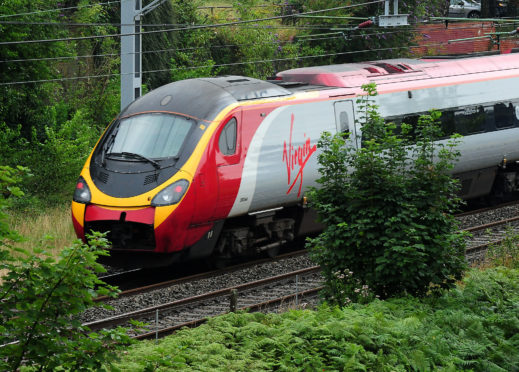
Britain’s longest-running rail franchise comes to an end on Saturday after more than 22 years as Virgin Trains operates its final services.
The firm, which began serving the West Coast Main Line in March 1997, is being replaced by Avanti West Coast.
Almost 500 million journeys have been made with Virgin Trains, which is owned by Sir Richard Branson’s Virgin Group and Stagecoach.
The final service will be the 9.42pm departure from London Euston to Wolverhampton.
Virgin Trains launched a series of innovations on Britain’s railways, including automatic delay compensation payments, an entertainment system allowing passengers to stream films and TV programmes on demand using their own devices, and making digital tickets available for all fare types.
Rail expert Mark Smith, founder of Seat61.com, said the operator – with the help of major infrastructure improvements – has “transformed” its network by almost tripling passenger numbers and doubling services on routes such as London-Glasgow.
He told the PA news agency: “I think they’ve done pretty well.
“They do have a certain panache and they communicate that to the staff and to the service. Quirky things like the toilets that talk to you, to onboard service with the food and wine.
“I’m going to be sorry to see them go.”
Virgin Group and Stagecoach saw their bid to continue running trains on the line disqualified by the Department for Transport (DfT) in April due to a row over pensions liabilities.
The companies are suing the DfT over its decision.
When the end of the franchise was announced, Sir Richard wrote in a blog post that he was “devastated”, adding that he wanted the operator to continue “for many more years”.
Virgin Trains recorded the highest passenger satisfaction rating of any franchised train operator in Britain in the most recent survey by watchdog Transport Focus.
The proportion of trains which arrived at their final destination within 10 minutes of the timetable during the franchise ranged from 33% in October-December 2000 to 91% in July-September 2010.
The latest figure – for July-September 2019 – was 78%.
Virgin Trains managing director Phil Whittingham, who will hold the same position with the new operator, said: “It’s been a wonderful 22 years transforming services on the west coast and we’re proud of everything our people have achieved in that time.
“We’re concentrating on a smooth handover to Avanti, who will be running services from Sunday. Customers should carry on booking and travelling as normal.”
Avanti West Coast is owned by First Trenitalia, a partnership between Aberdeen-based transport company FirstGroup and Italian firm Trenitalia.
It has pledged to deliver a range of passenger enhancements, including 263 more weekly services by 2022 when 23 new trains begin entering service.
The existing fleet of Pendolino trains will be refurbished with 25,000 new seats, more reliable wi-fi and improved catering.
Virgin Trains East Coast, another joint venture between Virgin and Stagecoach, agreed to pay the Government £3.3 billion to run trains on the East Coast Main Line from 2015 until 2023, but the contract was ended in June 2018 after they failed to achieve revenue targets.

Enjoy the convenience of having The Sunday Post delivered as a digital ePaper straight to your smartphone, tablet or computer.
Subscribe for only £5.49 a month and enjoy all the benefits of the printed paper as a digital replica.
Subscribe